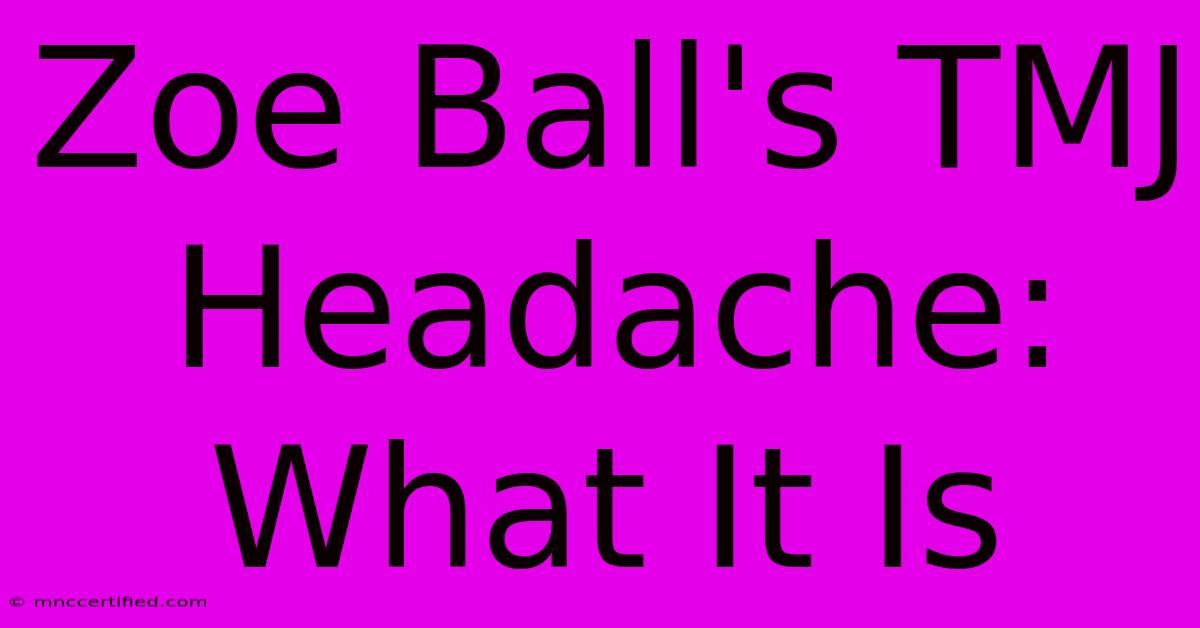Zoe Ball's TMJ Headache: What It Is

Table of Contents
Zoe Ball's TMJ Headache: Understanding Temporomandibular Joint Disorder
Zoe Ball, the beloved British radio and television presenter, has openly discussed her struggles with TMJ, or temporomandibular joint disorder. This has brought increased awareness to this often-overlooked condition. But what exactly is TMJ, and how does it cause headaches? This article will delve into the specifics of TMJ, its connection to headaches, and potential treatment options.
What is Temporomandibular Joint Disorder (TMJ)?
TMJ refers to a disorder affecting the temporomandibular joints (TMJs), the two joints connecting your jawbone to your skull on either side of your head. These joints are complex, enabling you to speak, chew, and yawn. When these joints become inflamed or misaligned, it can lead to a range of painful symptoms. TMJ is not a single disease but rather an umbrella term for several conditions impacting the jaw and surrounding muscles.
Common Symptoms of TMJ:
Symptoms can vary greatly in severity and type, making diagnosis challenging. Some common symptoms include:
- Headaches: Often described as dull, aching pain, typically affecting the temples, sides of the head, or even the back of the head. This is a key symptom Zoe Ball has highlighted.
- Jaw Pain: Pain in the jaw joint itself, often accompanied by clicking, popping, or grinding sounds when opening or closing the mouth.
- Facial Pain: Pain radiating to the face, cheeks, or ears.
- Earache: Pain or fullness in the ear, sometimes mimicking an ear infection.
- Difficulty Chewing: Pain or discomfort when chewing, making eating difficult.
- Limited Jaw Movement: Inability to open or close the mouth fully.
- Locking of the Jaw: The jaw becomes stuck in an open or closed position.
- Neck Pain: Pain radiating to the neck and shoulders.
The Link Between TMJ and Headaches:
The connection between TMJ and headaches is multifaceted. The muscles involved in chewing (masseter, temporalis, and pterygoid muscles) are closely connected to muscles in the head and neck. When the TMJs are dysfunctional, this tension can radiate upwards, triggering headaches. This is believed to be a significant factor in Zoe Ball's experience. The pain can be felt as tension headaches, migraines, or even other types of headaches.
Diagnosing TMJ:
Diagnosing TMJ requires a thorough examination by a dentist or a doctor specializing in temporomandibular disorders. They will assess your jaw movement, palpate the jaw muscles, and may order imaging tests (like X-rays or MRI scans) to rule out other conditions. Self-diagnosing is not recommended. If you are experiencing symptoms, seeking professional medical advice is crucial.
Treatment Options for TMJ:
Treatment plans for TMJ are tailored to the individual and the severity of their symptoms. Options may include:
- Conservative Treatments: These are often the first line of defense and include:
- Over-the-counter pain relievers: Ibuprofen or acetaminophen can help manage pain and inflammation.
- Heat or ice packs: Applying heat or ice to the affected area can provide temporary relief.
- Jaw exercises: Specific exercises can help improve jaw mobility and reduce muscle tension.
- Stress management techniques: Stress can exacerbate TMJ symptoms, so techniques like yoga or meditation can be beneficial.
- More Involved Treatments: If conservative methods are insufficient, more involved treatments might be considered:
- Mouthguards (splints): Custom-made mouthguards help realign the jaw and reduce grinding (bruxism).
- Physical therapy: A physical therapist can guide you through exercises and stretches to improve jaw mobility and reduce pain.
- Medication: In some cases, doctors might prescribe muscle relaxants, antidepressants, or other medications to manage pain and symptoms.
- Surgery: Surgery is generally considered a last resort for severe cases that haven't responded to other treatments.
Living with TMJ:
Living with TMJ can be challenging, but with the right management, individuals can significantly reduce their symptoms and improve their quality of life. Open communication with your healthcare provider is vital. Adopting healthy habits, such as maintaining good posture, managing stress, and eating a balanced diet can also contribute to better TMJ health. Zoe Ball's public discussion has helped to normalize the condition and encourage others to seek help.
Keywords: Zoe Ball TMJ, TMJ disorder, temporomandibular joint disorder, TMJ headache, jaw pain, facial pain, headache treatment, TMJ diagnosis, TMJ symptoms, TMJ treatment, mouthguard, jaw exercises, stress management, TMJ and stress
Note: This information is for educational purposes only and is not a substitute for professional medical advice. Always consult with a healthcare professional for any health concerns or before making any decisions related to your health or treatment.

Thank you for visiting our website wich cover about Zoe Ball's TMJ Headache: What It Is. We hope the information provided has been useful to you. Feel free to contact us if you have any questions or need further assistance. See you next time and dont miss to bookmark.
Featured Posts
-
Original Thanksgiving The Menu Revealed
Nov 29, 2024
-
Car Insurance Quotes Utica Ny
Nov 29, 2024
-
Shelter Insurance Mesquite Nv
Nov 29, 2024
-
Dental Insurance For Visitors
Nov 29, 2024
-
Cowboys Home Win Giants Vs Cowboys Score
Nov 29, 2024